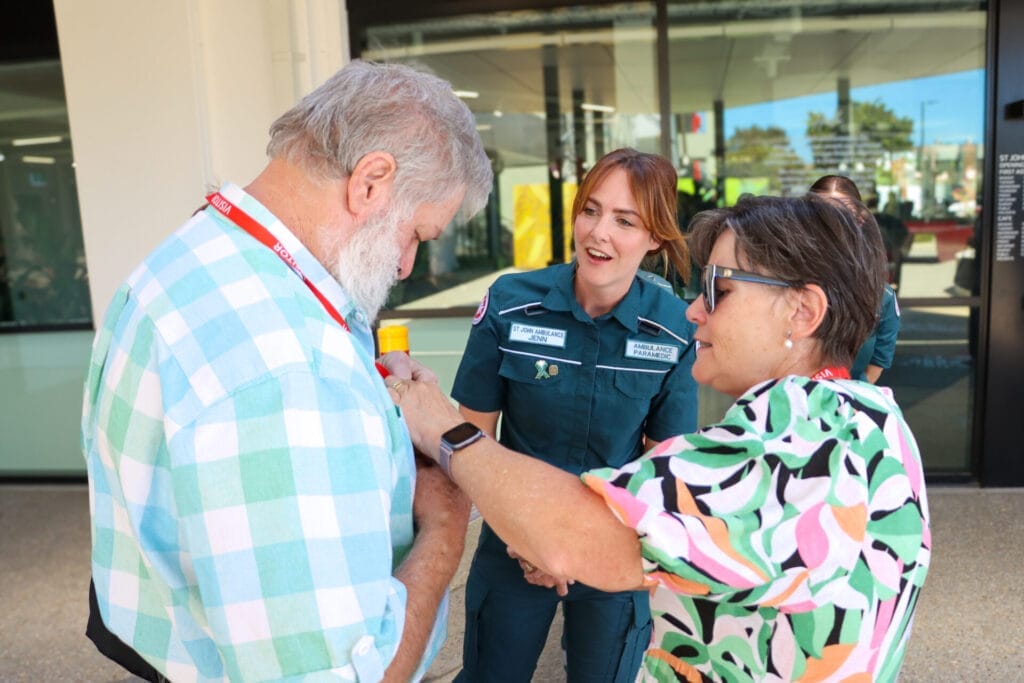Fairytale ending: Parliament cardiac arrest survivor to walk daughter down the aisle
Manjimup farmer Garry Kingston could never have imagined missing his daughter’s wedding, but his chance to walk her down the aisle was almost stolen from him as he lay unconscious in his wife’s Parliament House office on May 1.
His collapse had no symptoms, and no warning.
It was an out-of-hospital cardiac arrest (OHCA) — one of the deadliest medical emergencies that results in just a 1 in 10 survival rate.
Despite his heart stopping multiple times, Garry survived his silent heart attack thanks to immediate CPR and shocks delivered from a defibrillator at Parliament House and then by paramedics.
During the month of ‘Shocktober‘, with the support of his wife, former South West Region MLC Louise Kingston, Gary was reunited with the extraordinary people who stepped forward to save his life.
Garry’s sudden cardiac arrest happened just moments before Mrs Kingston was scheduled to deliver her valedictory speech to Parliament. Instead, she watched a different farewell scene unfold — one that teetered between life and death.
“If it had happened anywhere else, I would not still have him,” Mrs Kingston said. “He had no pain, no chest clutching, no dizziness. I honestly thought he was choking.
“It wasn’t until his breathing and pulse stopped that I knew it was his heart.
“What saved him were the people around him who knew what to do — and did it.”

Nurse Yvonne Fletcher from Hands-On Infection Control was administering flu shots at Parliament House and stepped in to assist with the CPR that helped save Garry’s life.
“Thanks to security guards Tony Paterson and Andrew Harland who worked to keep my husband alive, and Dr Jags Krishnan retrieving Parliament’s Automated External Defibrillator (AED),” Mrs Kingston said.
“What they did was nothing short of heroic.”
Mrs Kingston also praised everyone involved in her husband’s survival and recovery, including St John WA paramedics Jenn Clarke, Yasemin Miller and Brittany Naylor, among others.
“To all the St John WA officers — you are absolute heroes. And the Sir Charles Gairdner Hospital cardiothoracic team who performed his quadruple bypass, you’ve given us more time. For that, there aren’t enough thank-yous in the world,” she said.
According to St John WA’s latest Out-of-Hospital Cardiac Arrest (OHCA) Report, 133 people survived out of 1240 who suffered an OHCA in 2024 — almost 11 per cent.
More than 90 per cent of WA survivors have a good neurological recovery.
“That’s remarkable — and Garry gets teary when reflecting that he gets to be part of that 90 per cent,” Louise said.
“He’ll walk our daughter Jordan down the aisle next year. That’s something I wasn’t sure we’d see.”
WA’s community response rates continue to lead the country, with 81 per cent of patients receiving bystander CPR and 15 per cent having a defibrillator used before emergency crews arrived — figures well above national and international averages.

St John WA CEO Kevin Brown said Garry’s story captures exactly why publicly accessible AEDs and CPR training are so vital.
“Our community continues to step up. In the past year alone, WA saw a 16 per cent increase in registered defibrillators on our State Defibrillator Network, and a huge 18 per cent jump in community AEDs available 24/7,” he said.
“But we are not leading the nation as compared to South Australia, which has mandated for public community accessible AEDs.
“We want to see them become as common as fire extinguishers. These devices save lives, and Garry is living proof.”
Mrs Kingston agrees.
“I hope by speaking about it today, more people learn how to recognise the signs — or realise that sometimes, there aren’t any,” she said.
“And more importantly, I hope they learn CPR. It truly makes all the difference.”
To read the full 2024 OHCA Report click here.
